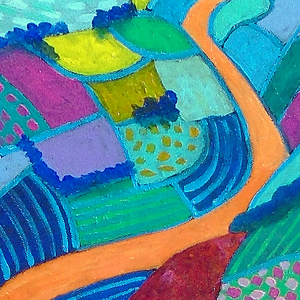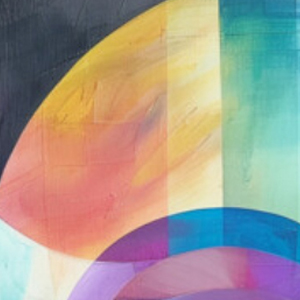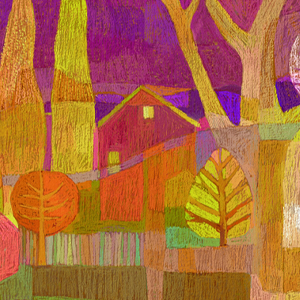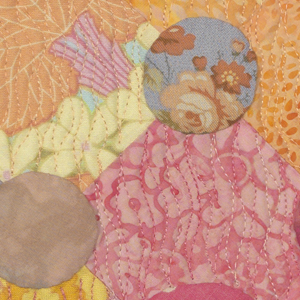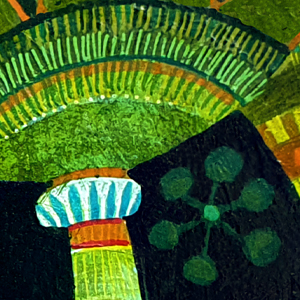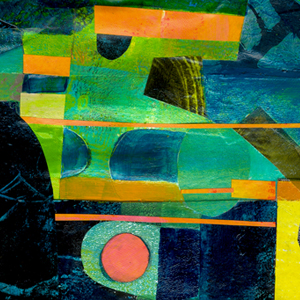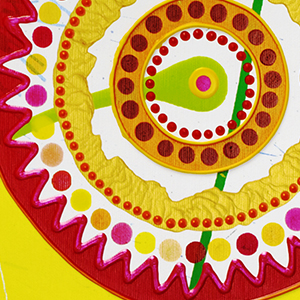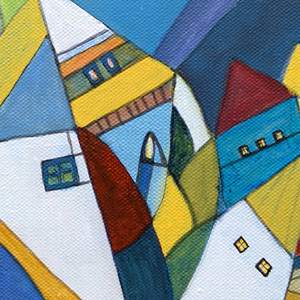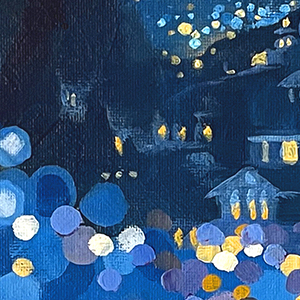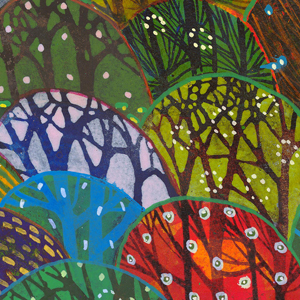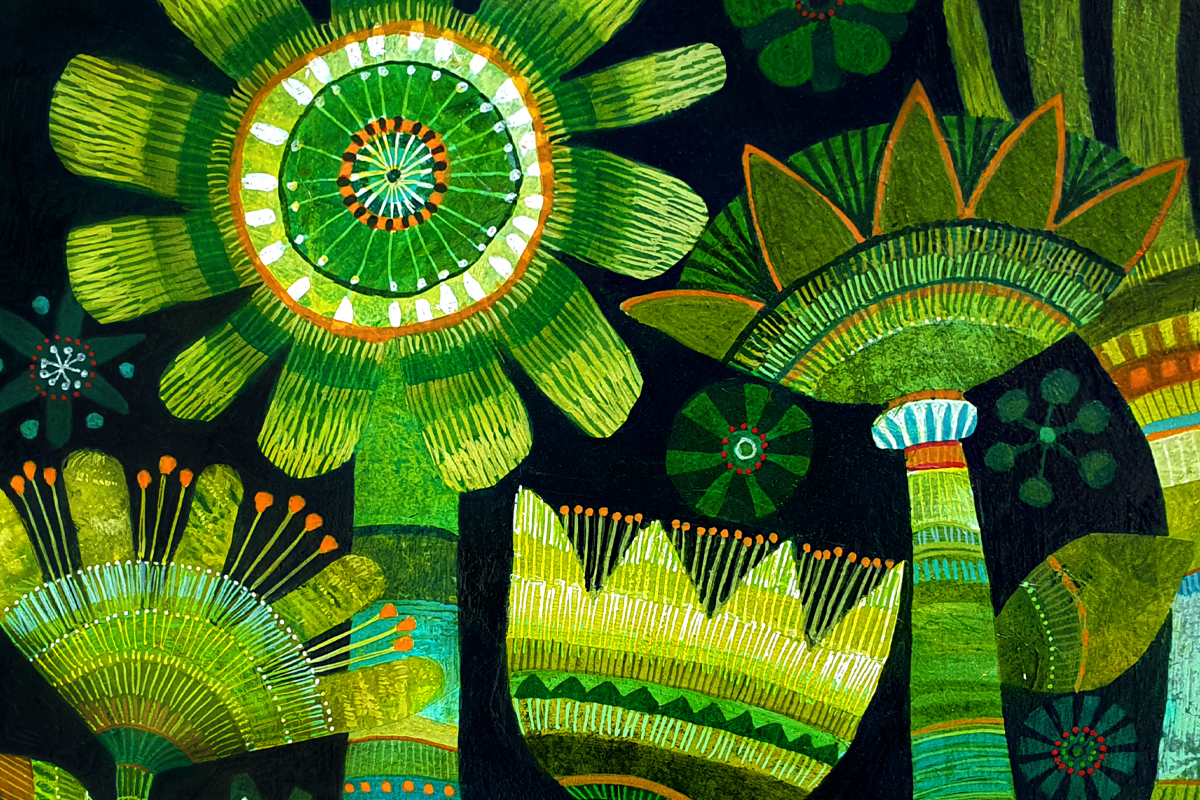
Defining Virtue
Chaplaincy for Everyday Democracy
Najeeba Syeed
Artwork: “Mountain Flowers” by Jo Scott © 2020
I recently sat across a room of 500 students and faculty from around the country, gathered for the annual Interfaith America summit. My own student was in the audience. I have looked at thousands of students, across hundreds of rooms in the last 15 years of my career as a professor.
I have also had the honor of serving as a staffer to an elected official, and have mediated dozens of conflicts in many contexts. Imbued in all of these spaces, and in the most recent times, I have begun to understand how much we must think about democracy with an everyday lens. How do people express their opinions on policy, how do they organize to have their voices heard, and why is decision-making often left to those who have formal power?
Where have the voices of everyday people gone? Maybe it is time to think about a model of:
Everyday democracy, coupled with the skills of care, and built on an ethic of hope.
What would it mean to be a chaplain for everyday democracy?
Space for Humble Listening
A chaplain for democracy listens, does not bully someone into engagement with others. They are curious; they walk with the person; they hear the pain. Listening is a practice of everyday democracy. One of the students in my interfaith scholars class last semester, Vernis Campbell, talked about learning to listen, what she called humble listening. To listen humbly is to set aside the ego and hear the pain of another. She captured a foundation of engagement that is often missed. In this spirit, humble listening is one way of understanding how past policies have caused harm.
When we try to build spaces for exercising civic engagement, we should also pay attention to the barriers that people face. Some are resource-driven, and some are trauma-induced. Engagement in systems takes vulnerability. We open ourselves and communities to the gaze and eyes of power that may be connected not just to decisions we disagree with, but decisions that hurt us or our communities.
I often ask people in conflict, “Who is human?”
We must open our own hearts to understand how we dehumanize others and how we are dehumanized. Policies built on dehumanization are the enemy of democracies. Let us learn to listen in a manner that humanizes everyone and builds societies predicated on common humanity. We may never reach common ground, but let us start with common humanity.
One of the greater gifts of religious communities to the practice of democracy can also be the recognition that humans operate and create meaning in communities. Spiritual spaces and organizations offer models of communal chaplaincy and the creation of common identities. In one of his speeches, Robert Bellah offers this reflection on religious communities:
“What I think is a healthier outcome is not that that internalization doesn’t happen—it must happen—but that it then moves back into a strong sense of commitment to community and the realization that one cannot fulfill one’s religious understanding except in and through community and that it is one’s common commitments.”1
How does one serve as a chaplain to a group and people fostering belonging in the process? Bellah suggests that our meaning happens in and through community.
In an increasingly polarized and pluralistic society, can we apply the lessons we learn from our home communities to the broader social system and network.
Lessons from Last November
At Augsburg University, one of the most diverse campuses in the country, I talked to two colleagues about pedagogies for times of high stress as we navigated the presidential election last fall. The day after the election, I spent time with faculty and staff colleagues in a gathering, facilitating discussion on that moment, then I led similar groups with graduate students in one discussion and undergraduates in another, and a meeting with student-facing services colleagues. From those meetings, I observed a few things about how universities can encourage community in service of democracy:
1. Cooperation
Augsburg has a cooperative approach between various offices on campus related to students. We met, across academic units, multicultural life, the dean of students office, campus life, athletics, campus ministries, and community wellness programs to think together, divide the labor, and be strategic. It is so important in times of crisis for an organization to have internal cohesion.
2. Our business is the care of our students
They are not the “problem” and they are not our enemies. The basic mission and function of the institution is to be caring, consistent, and effective in building community, hence the many gatherings of various types. We do not demonize any students, no matter what their viewpoints may be, they find a table to join and share. We must approach times of stress with a chaplaincy stance, open and curious. Organizations can begin to think about this viewpoint-diversity as a key strength for how we offer care. An invitation to share and learn encourages a process to collectively discuss and grow together.
3. We learn from our students
Honestly, this one is so important to me. As one student said, “I am so grateful to be in a space where we hear each other out.” I walked into rooms where students were having profound, in-depth conversations on their own as part of their natural way of interacting. Listening to mostly 17–22-year-olds deftly manage nuances in their analysis made me realize, they have skills to chaplain democracy. In fact, lived experience is expertise. In such a diverse environment, the depth and breadth of experiences become a well of knowledge and potential for a laboratory to learn in ways we can’t even imagine. This ultimately is the educational gift diversity gives an organization: a vital set of rich knowledge everyone can benefit from in a learning community. An intellectual opportunity for collective growth.
I am grateful for my colleagues, in awe of my students, and wishing we had more spaces like this one in other parts of our society and lives.
Compassion, critical thinking, and community can, indeed, support us all and build stronger bonds even in the most difficult and aggravating circumstances.
Multiply Power, Not Subtract
We live in a time and space where the notion of power is a zero-sum game. How can we spiritualize this discourse on power? Engage with people in ways that multiply a notion of power that is co-created?
Interdependence as the core of a chaplaincy for democracy is built on getting to our underlying interests and not just our status or title. We build processes and convenings not just focused on expressing the transactional, extractive modality of building power but also the collective care that people and communities seek. We build connections between communities across differences, with people who are able to hear, see, feel, and hold the other for a moment. It is often called “perspective-taking,” understanding a situation from the point of view of another.
I am hopeful that we can build an approach to dialogic engagement that is beyond the accumulation of power for one group, one community, and one candidate, and begin to think about chaplaincy as a model for power: an open-ended conversation that seeks to empower everyone, a non-judgmental open stance in the posture of the convenor and facilitator, a coaching of leaders to understand that values can be shared, but that it takes vulnerability to trust one another over time. Trusting another is not a weakness, but actually a mutual strength.
Beyond the Polls
Understandably, we focus on the ballot box as the generator for democracy. It is often the case that once someone is elected the fervor for them dies down. From campaigning to governance, one loses that connection to communities and individuals slow down in their engagement with democratic processes.
One of the roles we envision for higher education is a center for exercising democratic processes and principles. How do we build institutional capacity for diverging viewpoints and long-term disagreements? I’ve been very curious to see that many institutions who have an affiliation with religious communities or bodies have been spaces for conversations on ethics and values in the past year. Perhaps our chaplaincy of care and commitment to mutual flourishing means the university can become a space to protect all students. When values related to the big questions in life are embedded in how an institution runs, in how teachers educate, in how administrators make decisions, the bottom line is a human line. Are we building curricula that ask these moral and ethical questions in ways that are inclusive of students with different religious, spiritual, and non-religious commitments? A concern for the humanity of our students should be the guiding principle.
As we begin to think about the day after the next election, perhaps we spend less time gloating for whatever side wins, and begin to think more about how we create communities of care, resilience and everyday democracy, together.
I often ask parties in conflict, “are you in each other’s future?” When we are in conflict, it is the painful present and past we are most focused on and the future eludes us.I am in this for the long game, a future that includes you and me. Between elections, let’s listen, build, disagree, and co-create. Many spiritual traditions draw on the notion of making decisions with the next generations at the table. Engage with your body, your community, and the many who will come next, as if they are all on the line. Sometimes the way through is to open your line of vision to a future you cannot see yet; find uncommon allies and use hope as your fuel to get there.
Our futures depend on it.
Note
- Bellah, Robert N., “Habits of the Heart: Implications for Religion,” lecture (1986), robertbellah.com/lectures_5.htm.
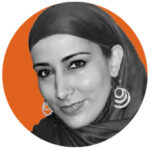 Najeeba Syeed is the inaugural El-Hibri endowed chair and executive director of Interfaith at Augsburg. She has been a professor, expert practitioner and public speaker for the last two decades in the fields of conflict resolution, interfaith studies, mediation, education, deliberative democracy, social, gender and racial equity. She twice received the Jon Anson Ford Award for reducing violence and was named Southern California Mediation Association’s “Peacemaker of the Year” in 2007.
Najeeba Syeed is the inaugural El-Hibri endowed chair and executive director of Interfaith at Augsburg. She has been a professor, expert practitioner and public speaker for the last two decades in the fields of conflict resolution, interfaith studies, mediation, education, deliberative democracy, social, gender and racial equity. She twice received the Jon Anson Ford Award for reducing violence and was named Southern California Mediation Association’s “Peacemaker of the Year” in 2007.
Spring 2025
Part I: Defining Virtue
James Arthur
Dayna L. Cunningham
Greg Lukianoff
Najeeba Syeed
Interlude: Defining Moments
Part II: Defining Vocation
MORE





